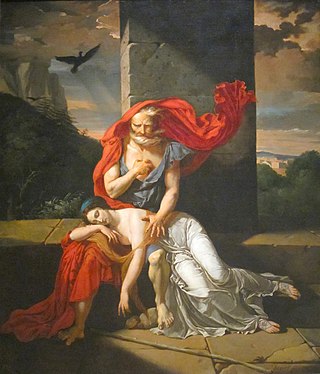A tragic hero is the protagonist of a tragedy.
Tragic hero may also refer to:
- Tragic Hero (film), directed in 1987 by Taylor Wong
- "Tragic Hero" (music), a single by Funker Vogt
- Tragic Hero Records, a record label
A tragic hero is the protagonist of a tragedy.
Tragic hero may also refer to:
Dual or Duals may refer to:
Matrix most commonly refers to:
Musical is the adjective of music.
Psyche is the Greek term for "soul".
Script may refer to:

Tragedy is a genre of drama based on human suffering and, mainly, the terrible or sorrowful events that befall a main character. Traditionally, the intention of tragedy is to invoke an accompanying catharsis, or a "pain [that] awakens pleasure", for the audience. While many cultures have developed forms that provoke this paradoxical response, the term tragedy often refers to a specific tradition of drama that has played a unique and important role historically in the self-definition of Western civilization. That tradition has been multiple and discontinuous, yet the term has often been used to invoke a powerful effect of cultural identity and historical continuity—"the Greeks and the Elizabethans, in one cultural form; Hellenes and Christians, in a common activity," as Raymond Williams puts it.
Punch commonly refers to:

A tragic hero is the protagonist of a tragedy. In his Poetics, Aristotle records the descriptions of the tragic hero to the playwright and strictly defines the place that the tragic hero must play and the kind of man he must be. Aristotle based his observations on previous dramas. Many of the most famous instances of tragic heroes appear in Greek literature, most notably the works of Sophocles and Euripides.
Necessary or necessity may refer to:
Identification or identify may refer to:
Mashup may refer to:
Willpower or will power may refer to:

The term hamartia derives from the Greek ἁμαρτία, from ἁμαρτάνειν hamartánein, which means "to miss the mark" or "to err". It is most often associated with Greek tragedy, although it is also used in Christian theology. The term is often said to depict the flaws or defects of a character and portraying these as the reason of a potential downfall. However, other critics point to the term's derivation and say that it refers only to a tragic but random accident or mistake, with devastating consequences but with no judgment implied as to the character.
End, END, Ending, or variation, may refer to:
Thick may refer to:
Punch and Judy is a traditional puppet show featuring Mr. Punch and his wife Judy.
Tendency or tendencies may refer to:
Actaeon or Acteon (Ἀκτέων) was a hero in Greek mythology.
Purpose is the end for which something is done, created or for which it exists. It is part of the topic of intentionality and goal-seeking behavior.
Fallen Heroes or Fallen Hero may refer to: